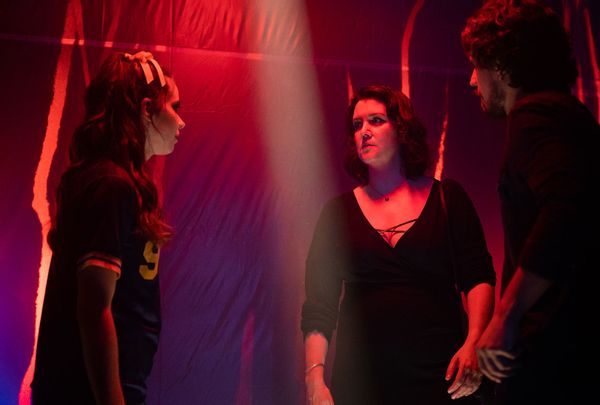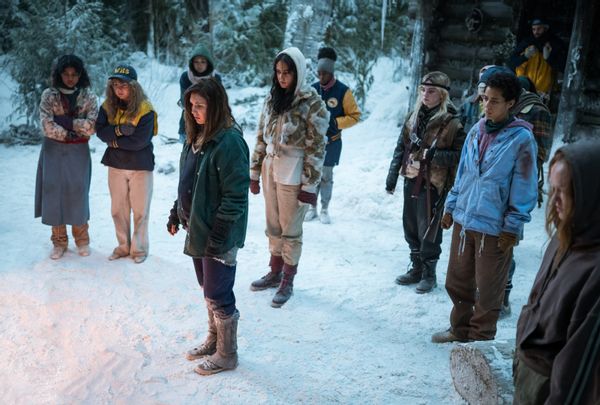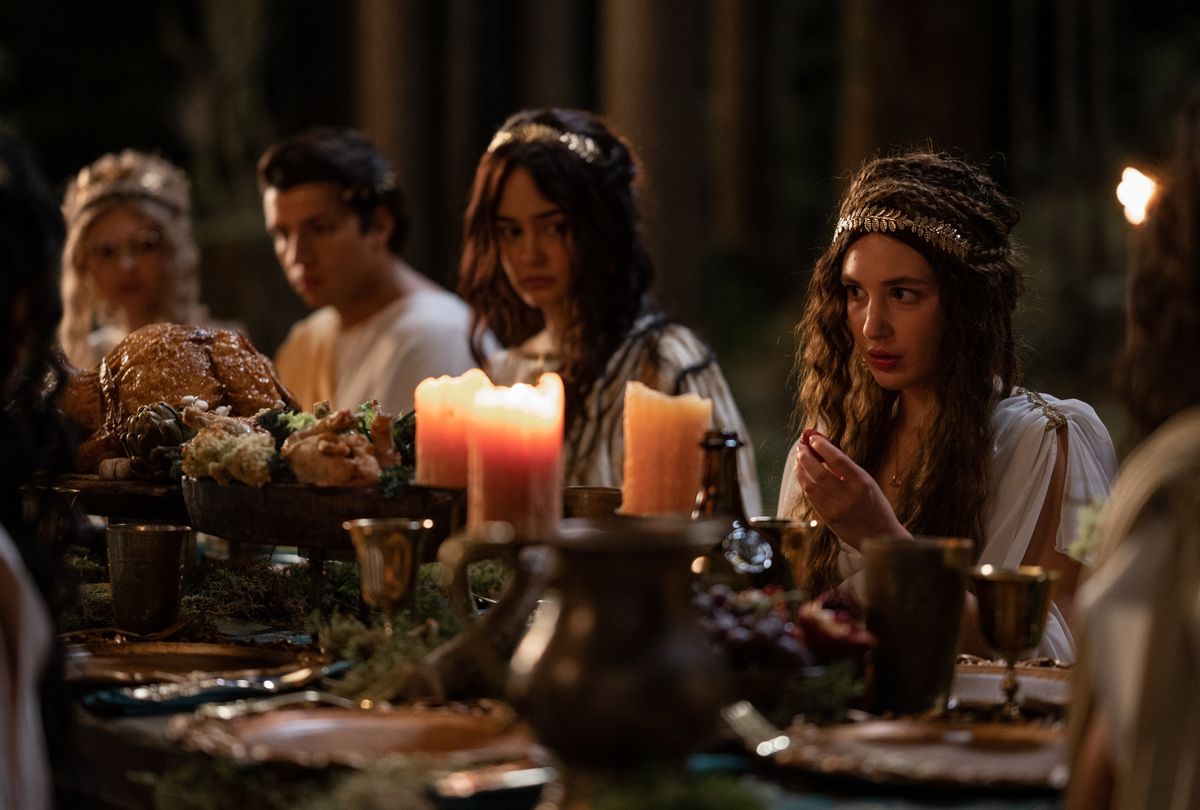Could you trust someone who ate your friend?
The question haunts the surviving characters on "Yellowjackets," Showtime's hit series about a high school girls' soccer team surviving in the Canadian wilderness after their plane crashes. Loosely inspired by the real life Uruguayan Air Force Flight 571 tragedy and "Lord of the Flies," the show has always teased its descent into cannibalism. But as much as it's a story about gore, it's also about its consequences. Once you get a taste for flesh in the dead of winter with no food nearby (aside from your teammates), the lingering question is not about what's next — but who.
"Yes, we will still eat each other. We exist."
Eating soccer team member Jackie (Ella Purnell) was, for all intents and purposes, like breaking the seal. Once you've done it, the floodgates are open. Season 2 commenced with the team cracking the gates. Now, as it reaches its climactic finale, the anticipation for a second helping, which has been rising throughout the season, is reaching its peak. This is tacitly understood by the Yellowjackets, as their relationships to each other shift since understanding that anyone could be dinner. It is, after all, Jackie's best friend, Shauna (Sophie Nélisse) who first voices that they should eat her.
Yes, we are teammates and perhaps still close friends who are intimately bonded by going through a traumatic experience together, the characters seem to agree. Yes, we will still eat each other. We exist.
No one can blame them for having trust issues that extend well into their adult lives, growing wary of friends and strangers. Though their fear of others is prompted by a situation of extremes, it's an anxiety that is realistic, even persistent today — and it's what undergirds the horror of their cannibalism.
In "Qui" we get a grim reminder about fraying trust. The fantasy sequence after Shauna gives birth spends time recounting the agony of not being able to breastfeed. With Shauna at her wit's end, the baby finally latches but the victory makes the crew's decision to eat the newborn, knowing he now had a chance of survival, that much more horrific. It doesn't help that the bloody scene lives up to the show's gruesome reputation or that the paranoia built steadily throughout the season with Shauna's mistrust of Lottie (Courtney Eaton) getting too close to the baby. Despite the baby-feeding being a dream, the nightmare attests to how Shauna subconsciously knows it's possible and, indeed, continues to see flashes of her friends eating her son after waking.
 Sarah Desjardins as Callie Sadecki, Melanie Lynskey as Shauna and Peter Gadiot as Adam in "Yellowjackets" (Kailey Schwerman/SHOWTIME)In the present timeline, the characters don't trust any easier, especially when it comes to strangers like Walter (Elijah Wood), who raises Misty's suspicions when he wants to spend time with her. Poor Adam (Peter Gadiot) knows this all too well, entering into an affair with Melanie Lynskey's adult Shauna only to end up dead with his hands, feet, head and tattoos severed off because she can't trust his desire is authentic. Instead, she mistakes the man who devoted canvas upon canvas to capturing her beauty as her blackmailer in place of her actual blackmailer, her husband Jeff (Warren Kole). Surrounded by betrayals and about-faces, it's no wonder that Shauna and the rest of the survivors are quick to fear thy neighbor.
Sarah Desjardins as Callie Sadecki, Melanie Lynskey as Shauna and Peter Gadiot as Adam in "Yellowjackets" (Kailey Schwerman/SHOWTIME)In the present timeline, the characters don't trust any easier, especially when it comes to strangers like Walter (Elijah Wood), who raises Misty's suspicions when he wants to spend time with her. Poor Adam (Peter Gadiot) knows this all too well, entering into an affair with Melanie Lynskey's adult Shauna only to end up dead with his hands, feet, head and tattoos severed off because she can't trust his desire is authentic. Instead, she mistakes the man who devoted canvas upon canvas to capturing her beauty as her blackmailer in place of her actual blackmailer, her husband Jeff (Warren Kole). Surrounded by betrayals and about-faces, it's no wonder that Shauna and the rest of the survivors are quick to fear thy neighbor.
It took cannibalism and surviving the wilderness for the Yellowjackets to arrive where we are today: wary of each other, opting for individualism rather than mutuality.
But so, too, do we. According to a Pew Research survey, 58% of Americans know only some or none of their neighbors. In fact, a 2022 survey found that one in four homeowners admit to spying on their neighbors via surveillance technology. This is a significant change from the days of yore when one-third of Americans in the '70s reported spending time with neighbors twice a week. The pandemic — which is when the show first aired to a whopping 5 million weekly viewers — heighted and complicated these emotions when people themselves posed a danger, potentially carrying the virus, not masking or refusing to vaccinate. Since COVID-19, only 27% of Americans think community is important, down 33% from 2019, according to a poll by the Wall Street Journal and NORC at the University of Chicago. It took cannibalism and surviving the wilderness for the Yellowjackets to arrive where we are today: wary of each other, opting for individualism rather than mutuality.
The horror genre has taught us that monsters are more than their on-screen visualization; they are psychological fears. "Yellowjackets" showrunner Jonathan Lisco makes this clear, telling Screenrant, "The show is not about if cannibalism, it's about why cannibalism and how cannibalism." If eating humans wasn't incorrigible enough, the show employs the genre to tap into our deeper fear of each other and community where close proximity is forced.
By invoking it, characters justify crime. In "It Chooses," Misty defends killing private investigator Jessica Roberts (Rekha Sharma) because it was "for the good of the group." Of course, this same principle also justifies the show's most horrific act: cannibalism. Let us hunt you down, kill you and then eat you because it ensures the survival of the rest of the team. It's called being a team player.
 (L-R): Nuha Jes Izman as Teen Crystal, Samantha Hanratty as Teen Misty, Alexa Barajas as Teen Mari, Sophie Nélisse as Teen Shauna, Courtney Eaton as Teen Lottie, Nia Sondaya as Teen Akilah, Sophie Thatcher as Teen Natalie, Jasmin Savoy Brown as Teen Taissa, Steven Krueger as Ben Scott and Liv Hewson as Teen Van in "Yellowjackets" Season 2. (Kailey Schwerman/SHOWTIME)
(L-R): Nuha Jes Izman as Teen Crystal, Samantha Hanratty as Teen Misty, Alexa Barajas as Teen Mari, Sophie Nélisse as Teen Shauna, Courtney Eaton as Teen Lottie, Nia Sondaya as Teen Akilah, Sophie Thatcher as Teen Natalie, Jasmin Savoy Brown as Teen Taissa, Steven Krueger as Ben Scott and Liv Hewson as Teen Van in "Yellowjackets" Season 2. (Kailey Schwerman/SHOWTIME)
In "It Chooses," when the Yellowjackets decide to eat a second person, the scene teeters between upholding and breaking community. The teens pick cards, just like they would when divvying up chores, and the lucky person to pick the queen (which, in this case, is Natalie) gets to be dinner. The anxiety and anticipation is even greater than the first time because it's premeditated. To participate in the game is to consent to be potentially eaten or eat a friend. For the sake of collective survival, the teens resort to cannibalism. By breaking the sacred community oath of not turning on one another, that cannibalism becomes even harder to stomach.
Want a daily wrap-up of all the news and commentary Salon has to offer? Subscribe to our morning newsletter, Crash Course.
The Yellowjackets cannibalize community, and perhaps how the genre taps into this fear that made it so popular in the last two years, from "Bones and All" to "Dahmer" to "The Last of Us." But if the show captures our anxieties of the collective, it also critiques it. Lack of community kills. The team's entire survival hinges on the fact that they can work together and share their various skills: Misty the quasi-doctor, Natalie the hunter and Lottie the morale director.
Ironically, what brings the team together is cannibalism. It's the threat of being found out as cannibals that brings Misty, Natalie, Shauna and Taissa together in Season 1. In "Edible Complex," when the girls barbecue Jackie's body and finally eat her, they are transported to a fantastical scene, surrounding a hearty dinner table as if everything is right in the world. It makes sense; nothing brings people together quite like breaking bread (or bones).
Read more
about this topic



Shares